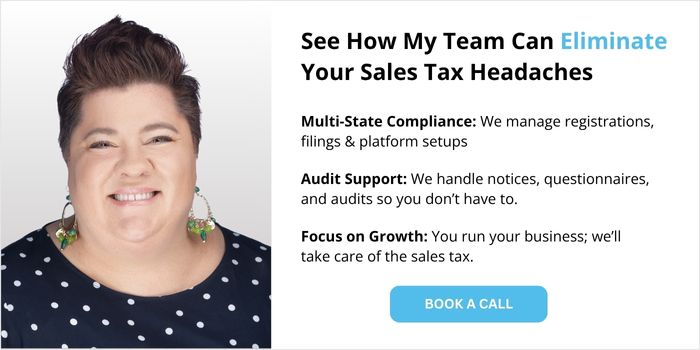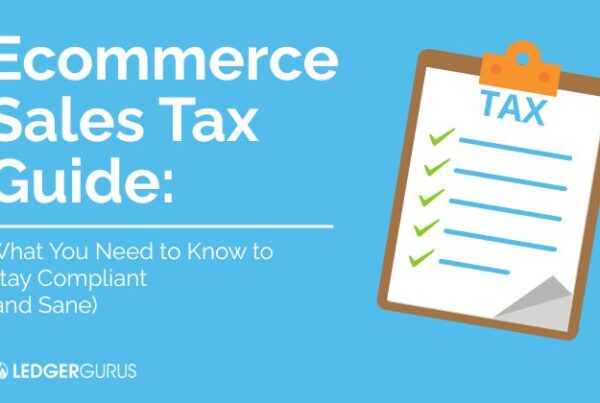States are getting serious about sales tax compliance, especially since the Wayfair decision in 2018.
Recently, some states like Illinois, Washington, and Missouri have started sending out sales tax pre-audit questionnaires to ecommerce businesses to check for compliance.

This applies to both registered AND nonregistered businesses.
We want to help you be prepared and avoid the headache of an audit, if possible.
If you have received one of these questionnaires and you’re not sure how to handle it, we can help. Our sales tax experts can guide you through what you need to do and how to move forward.
We recently did a video on these questionnaires, so watch it for an overview.
In this article, we’ll cover:
- What a pre-audit questionnaire is
- Why states are sending them out
- Who is getting them
- What they are looking for
- How to respond to a pre-audit questionnaire
- What happens if you ignore it
- How to protect your ecommerce business from sales tax liability problems
- How to get help
Let’s get into it.
Key Takeaways
- Don’t ignore pre-audit questionnaires: Receiving a pre-audit questionnaire from a state is a serious matter. Ignoring it could lead to a full audit, which can result in costly penalties, back taxes, and interest.
- Understand what states are looking for: States are using these questionnaires to identify businesses that may have crossed sales thresholds without complying with sales tax obligations. They’re particularly focused on historical sales data dating back to 2018.
- Get help if you need it: If you’re unsure about how to respond or where you stand with sales tax compliance, it’s crucial to seek professional assistance. A thorough nexus analysis or expert guidance can help you avoid potential pitfalls and ensure you’re on the right track.
What’s a Pre-Audit Questionnaire?
A pre-audit questionnaire is basically a screening tool that states are using to figure out if your business has been compliant with sales tax laws.
These questionnaires are not just a “soft ask” — if you get one, it’s a big deal.
Think of it like a pre-check — the state is looking for red flags that you may have crossed sales thresholds and should’ve been collecting sales tax but haven’t.
The goal? To determine whether they need to dig deeper and perform a full audit.
These forms can ask for sales data going all the way back to October 2018.
That was when the Wayfair decision allowed states to require businesses without a physical presence to collect and remit sales tax once they meet certain thresholds.
This is known as economic nexus.
So, if your business crossed those thresholds but wasn’t paying taxes at the time, the state wants to know about it.
Getting a pre-audit questionnaire is your chance to address potential issues before the state decides to launch a full sales tax audit.
Why States are Sending Out Sales Tax Pre-Audit Questionnaires
Since the Wayfair decision, states have gotten much more serious about collecting sales tax from online sellers.
With the explosion of ecommerce, states want to be sure they’re getting their sales tax and that no one is slipping through the cracks.
That’s where these pre-audit questionnaires come in — they help states identify gaps in compliance.
In many cases, states are using data from marketplaces and payment processors to find sellers who may have flown under the radar.
But they’re not just looking for businesses to start complying from now on. States want to recoup taxes they believe should have been paid in the past.
This is especially true for businesses that unknowingly crossed nexus thresholds — meaning you may have triggered tax obligations without even realizing it.
Who is Getting These Sales Tax Pre-Audit Questionnaires?
States like Missouri, Washington, and Arizona are aggressively sending these questionnaires to both registered and unregistered sellers if they believe that the economic nexus threshold has been crossed and sales tax should’ve been collected.
But it’s not just these states you need to watch out for.
Other states, particularly those with large populations like Florida and California, could soon follow suit with similar tactics.
As states see the success of these pre-audit efforts, it’s likely that more will join the trend, making it crucial for businesses to stay on top of their sales tax obligations.
What States are Asking for in Sales Tax Pre-Audit Questionnaires
These questionnaires typically ask about the details of your business, including:
- Where you’re selling: States want to know the locations where your sales are happening.
- How much you’re selling: They’re interested in the volume of your sales to see if you’ve crossed any nexus thresholds.
- Sales tax collection and remittance: The big question is whether you’ve been properly collecting and remitting sales tax.
Essentially, states are fishing for inconsistencies. They’re looking to see if you might have missed registering for sales tax in a state where you should have, or if there are discrepancies in your reported sales figures.
One key point is that many of these questionnaires ask for historical sales data going back to 2018.
What to Do If You Get a Pre-Audit Questionnaire
First things first: don’t panic. But definitely don’t ignore it either!
You’ll want to respond quickly and be accurate and thorough in your responses.
If something seems confusing, it’s worth talking to a professional to make sure you’re handling it the right way.
This is one of those times where the details matter, so take your time and get it right.
What Happens If You Ignore a Pre-Audit Questionnaire
Spoiler alert: It won’t end well.
Ignoring a pre-audit questionnaire is basically like waving a big red flag in front of the state saying, “Audit me!”
Audits can result in penalties, back taxes, and interest, making it a very costly mistake.
How to Protect Your eCommerce Business from Sales Tax Liability Problems
If you’re worried about these questionnaires or just want to make sure you’re in the clear, now’s the time to get your sales tax situation sorted.
What do you need to be doing?
- Make sure you’re registered in all the states where you have nexus.
- Be sure you are collecting and remitting sales tax properly.
- Ensure all your documentation is up to date.
If you have not already received a pre-audit questionnaire, you still have some options.
- If you have recently passed the threshold, register quickly and start filing taxes. Be proactive.
- If you passed the threshold a while ago and already have significant exposure in a state, consider a Voluntary Disclosure Agreement (VDA). This can help you reduce your liability and avoid an audit.
One thing you need to know is that once you receive a pre-audit questionnaire, your options are limited.
A VDA is a potent tool to alleviate your sales tax burden, but it is no longer an option once you receive that questionnaire.
So, don’t wait! Be proactive and protect your business!
Next Steps: Get Help Before It’s Too Late!
Pre-audit questionnaires might seem like a small thing, but they’re not something you can afford to ignore.
Take them seriously, get your sales tax records in order, and don’t hesitate to ask for help if you need it.
We have several options for you to choose from:
- Nexus analysis: If you’re unsure about where you have nexus, our sales tax team here at LedgerGurus can conduct a thorough nexus analysis. It’s better to get this done now rather than face issues later.
- Questionnaire assistance: If you receive a pre-audit questionnaire and aren’t confident about handling it yourself, our sales tax experts are available to guide you through the process and ensure it’s filled out correctly. Schedule a consultation.
- Sales tax compliance: If you need help with your overall sales tax compliance, don’t hesitate to reach out. We can assess your situation and get you back on the right track.





